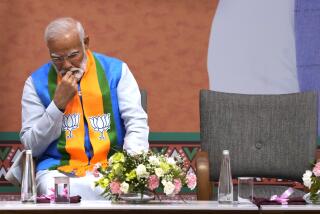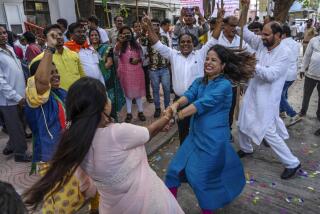India’s Democracy Could Come of Age With Emergence of Effective Opposition
- Share via
NEW DELHI — Since India was born as a democracy 40 years ago, it has been ruled by the Congress Party, usually enjoying an imposing majority in the Parliament. With a monopoly of power comes a potential for abuse. Democracy suffers because of a lack of serious legislative restraint on the ruling party. In the past 20 years, successive anti-civil-liberty measures have been passed in Parliament by an overwhelming majority.
The most notorious was the Defamation Bill enacted last September. The law would have destroyed freedom of the press. Fortunately, the government finally withdrew the measure in the face of press opposition, supported by the intelligentsia and the electorate at large. Perhaps the pendulum now swings the other way.
The future of Indian democracy depends upon the emergence of an organized, effective opposition to the party in power. And this may finally happen, as indicated by events in outlying states.
Madras is about 2,000 kilometers south of Delhi; politically and psychologically it is much further away. The two cities had lived with each other for decades in a comfortable political isolation. They cannot any longer, for Madras now has a government Delhi opposes. In a January election, the people of the state of Tamil Nadu made choices that have to trouble the ruling Congress-I ( I for Indira Gandhi) Party: 27 seats for the Congress and 170 seats for the Dravida Munnetra Kazhagam (DMK) Party out of 232 state legislative seats at stake.
That was a crushing defeat for the Congress leader, Prime Minister Rajiv Gandhi, who staked his own stature on this election. It need not have been a contest between Delhi and Madras, but Gandhi made it one.
For two decades, Tamil Nadu has been ruled by one of two regional parties, with Congress playing the role of a junior ally to one of them. This time the Congress decided to fight regional Tamil parties. More daring was Gandhi’s decision to make this not-so-hospitable terrain a testing ground of his personal popularity. Over six months he made more than a dozen visits to this southern state, promising things no one believed he could deliver, including an end to corruption in politics. He hurt the pride of the Tamil people, so proud of their distinct cultural identity, by describing the rule of the Tamil parties as “dark rule.”
Normally what happens in states like Tamil Nadu, Kerala or Assam--somewhat peripheral to the national mainstream as defined by the politically dominant Hindi heartland--does not much affect national politics. But the outcome in Tamil Nadu has disturbed the balance within the Congress Party and between the Congress and its opponents. The political integration of this culturally diverse country has ripened to a point where regional politics is beginning to weigh in national politics. But the immediate significance of what happened in Madras is that all observers saw Tamil Nadu as a preview of the national contest near the end of this year (an election date has not been set).
The Hindi heartland, which always decides the national winner, is in disarray. Encouraged by the Congress defeat in Tamil Nadu, disaffected congressmen in Bihar have challenged the leadership there. In Madhya Pradesh, Rajasthan and Gujarat, congressmen wanting power and pelf demand a stiff price for their party “loyalty.” Economically backward but politically all-important Uttar Pradesh is no longer secure for the Congress.
The prospect of a declining Congress Party presents opponents with a long- awaited moment to make a bid for power in the national election. The major national opposition parties are the Janta, the Lok Dal and the newly formed Jan Mureha. Normally they are at war with one another, though lately they have united to form what is called the Janta Dal. Whether this is a paper unity or a durable arrangement is a question the Indian voter asks, for the past record of opposition parties, in or out of power, is dismal.
The crucial issue--who will direct the opposition--remains unresolved, despite the nominal leadership of Vishwanath Pratap Singh. A former Cabinet minister, Singh left the Congress Party to protest kickbacks in a defense deal. His pronounced moral streak appeals to Indians; they like a king to be just and a touch austere.
Past failures to develop a workable coalition of opposition is one of the most perplexing questions of Indian politics. The problem is not so much reconciling divergent interests as reconciling the clashing egos and ambitions of singular leaders. In practice many of the parties, including the Congress, are like a faceless orchestra led by a fiery conductor. A party is often named after an individual here, where personality matters much more than institutions.
Regardless of who wins, the coming election will be the most significant contest since 1967. In 22 years, the country has never had an election typical of those in other parliamentary democracies. Competition for power between various interest groups--a common phenomenon in democratic politics--has been overshadowed by the rise of the cult of personality.
Indira Gandhi in 1970 established absolute dominance over the political system by greatly devaluing institutions--the Congress Party, the judiciary and the bureaucracy. Every election since 1967 then became a kind of referendum staged to legitimize one-person rule. And each election was fought on such catchy populist slogans as “erase poverty,” “save the country” or “national glory.”
But Rajiv Gandhi cannot match Indira Gandhi, his mother; personality and populist slogans can no longer be substitutes for performance. Congress’ only appeal is political stability under one party.
The responsible Indian voter has a poor choice: between a mal-performing but fairly cohesive Congress under one leader and the still-uncohesive opposition parties. Should the opposition, however, truly unite under one leader it would be a formidable rival.
Gone are the days when the Congress could secure a more than two-thirds majority. Yet a two- or three-party system as exists in Western nations is not yet possible in a country as culturally diverse as India. Regional parties that articulate regional interests and regional cultures will always command power. The entire south and east are ruled by regional parties mostly hostile or apathetic to Delhi. Regional variations and cultural diversity are what really provide the roots of Indian democracy. The former prime minister of Pakistan, Zulfikar Ali Bhutto, who had promised to wage a thousand-year war with Hindu India, once said that it was the noise and cacophony of India that saves it from becoming authoritarian. That noise comes from its diversity.
More to Read
Sign up for Essential California
The most important California stories and recommendations in your inbox every morning.
You may occasionally receive promotional content from the Los Angeles Times.













